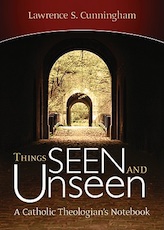Lawrence S. Cunningham is the John A. O'Brien Professor of Theology at the University of Notre Dame. A leading U.S. scholar and award-winning professor, he is best known for his work in the areas of systematic theology and culture, Catholic spirituality, and Catholic saints. Cunningham has been the "Booknotes" columnist for Commonweal for more than 10 years. This sturdy reading and reflection notebook contains his thoughts and musings on people, books, and articles; thoughtful quotations he has read; his insights and epiphanies; responses to popular culture; and assessment of the Catholic Church and its doings. Karl Rahner was once asked about his life as a Jesuit theologian and he replied: "I did not lead a life. I worked, wrote, taught, tried to do my duty and earn a living. I tried this ordinary way of serving God." Cunningham feels the same about his calling and mission in the academic world.
In The Catechism of the Catholic Church, one learns that the word "heart" appears over a thousand times in the Bible. We could use a primer on the meanings and obligations of this spiritual virtue. Cunningham notes that Francis de Sales would ask people "How is your heart?" A few pages later, he states: "The Italian verb for "to remember" is ricordare — literally it means: to bring back to the heart."
Unlike Thomas Merton who was in love with the night, Cunningham's favorite time at the monastery is the period from four and six o'clock in the morning: "The night interval allows one to think about other people who are awake at that time who do not want to be awake: a mother soothing a sick child; a husband drinking coffee in the kitchen, wondering how he is going to make his car payment; a street person wandering around; someone in too much pain to sleep in a hospital bed. . . . To remember these people at that hour is close to a prayer for and with them — an act of solidarity for those who are in need."
Cunningham ponders the meaning of the Magi who visited Jesus at his birth; the ways in which Cardinal John Henry Newman saw spirituality as doing the ordinary well; the terse rule of Saint Comgall of Bangor ("Love Christ. Hate wealth. Piety toward the King of the sun. Smoothness toward all men. Amen."); the two things that impressed Charles de Foucauld about Islam: adoration and hospitality; the trivialization of Easter in the West; reasons he opposes the death penalty; and the importance of listening in the life of faith. Anyone who is a devoted reader will enjoy and savor these notebook observations by Lawrence Cunningham.
